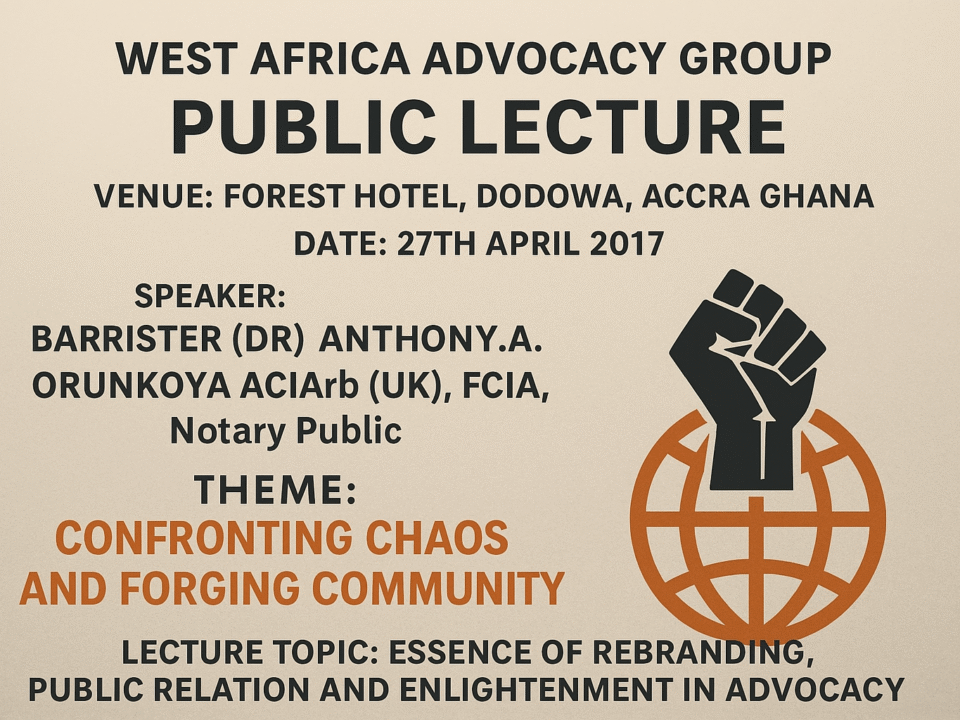
Confronting Chaos and Forging Community: The Essence of Rebranding, Public Relation, and Enlightenment in Advocacy
October 10, 2025
Dr. AA Orunkoya Leads AHUSC on Official Visit to UNIMAR to Strengthen Cross-Border Education Collaboration
October 27, 2025Lecture Delivered by Dr. A.A. Orunkoya Esq
At Leadership Workshop Organised by Civil Rights Groups in South East Region
Date: 4th June 2021
Venue: Dolly Hills Hotel, Onitsha, Anambra State
With humility, I welcome you all to this great occasion of the Two Days Leadership Workshop of the South-East region of Civil Rights Groups. The theme of this leadership workshop is: Good Leadership as a Panacea to Insecurity and Anarchy.
The first topic under this theme is: Security Everyone’s Burden.
I want to commend the organizers for this great initiative. This theme is timely because of the current insecurity in our country, Nigeria, and most particularly the South Eastern region.
It is needless for me to define security as we all know what security connotes. Insecurity is when life, properties, businesses, and our social lives are put at risk or endangered by acts of criminality, namely stealing, armed robbery, kidnapping, assassinations, warfare, and terrorist attacks.
When there is insecurity, the socio-economic, cultural, and political life of the people becomes a subject of anarchy, and the center cannot hold. Where there is insecurity, there is affliction, sorrow, tears, and blood. Lives are lost, and the future becomes bleak because the youths of today, who are the leaders of tomorrow, are wasted as their lives are cut short by deviants and criminals as a result of lawlessness arising from insecurity.
Where there is insecurity, wives become widows, mothers become childless, and fathers bury their young. Businesses collapse, and the rate of criminality increases. Premised on the above analysis, it would be right to say that security is everybody’s burden because one reckless insecurity issue can make life miserable for a million people.
What Are the Causes of Insecurity?
One major cause of insecurity is Bad Leadership. It is correct to say that the initiators of this workshop reasoned deeply to tailor the theme as Good Leadership as a Panacea to Insecurity and Anarchy.
Leadership simply means the act of directing or leading a group of persons or a country. If the leader of a country fails in the discharge of their responsibility, the entire country will be insecure due to the failure of various sectors, ranging from political to socio-economic, cultural, and general well-being of the people.
It is bad leadership that leads to unemployment. Where there is unemployment, youths and able-bodied men will take to crime as a way of life. Presently, there are no jobs in Nigeria because our leaders have failed to implement policies that aid job creation. Due to lack of jobs, we now have an increase in crimes such as internet fraud, armed robbery, kidnapping, assassination, etc.
If there is good governance, corruption would be minimal, and the resources of the country would be properly managed for the growth and development of the people. Our politicians do not only embezzle our commonwealth but take it abroad to buy luxurious houses for themselves and their families, thereby increasing the poverty rate in Nigeria due to lack of amenities, social infrastructure, standard education, standard healthcare, and reduced living standards.
Today, Nigeria’s poverty index is second only to India. For a proper understanding, here is the poverty index of Nigeria as prepared by the Nigeria Bureau of Statistics, as reported in Wikipedia:
Nigeria Poverty Rate 1985-2021
- 2018: 92.00% (-0.9% decline from 2009)
- 2009: 92.90% (-2% decline from 2003)
- 2003: 94.90% (+1.5% increase from 1996)
- 1996: 93.40% (-0.1% decline from 1992)
- 1992: 93.50% (-0.8% decline from 1985)
- 1985: 94.30% (-0.8% decline)
Poverty can be expressed in a single index. The simplest and most common measure is the Head Count Ratio (H), which is the ratio of the number of poor to the total population. This gives the proportion of the population with income below the poverty line.
Total Revenue Available to States in 2020
| STATE | FAAC 2020 (N) | IGR 2020 (N) | Total Revenue 2020 (N) | % Share FAAC | % Share IGR | Total Revenue 2019 (N) | YoY Growth % |
|---|---|---|---|---|---|---|---|
| Abia | 48,369,064,079.91 | 14,376,871,322.30 | 62,745,935,402.21 | 2.11% | 1.10% | 66,809,176,283.42 | -6.08% |
| … | … | … | … | … | … | … | … |
| FCT | 67,064,632,994.32 | 92,059,700,897.42 | 159,124,333,891.74 | 2.92% | 7.05% | 146,469,449,836.60 | 8.64% |
| Total | 2,293,850,590,512.37 | 1,306,075,020,099.92 | 3,599,925,610,612.29 | 100% | 100% | 3,807,463,975,557.00 | -5.45% |
From the above table, you would agree that billions of naira are shared among the states of the Federation, yet there is poverty everywhere. The effect of poverty is insecurity of lives and properties. The only solution is good governance.
Effective Leadership and Its Impact on Good Governance
Without effective leadership and good governance at all levels—in private, public, and civil organizations—it is impossible to achieve and sustain effective administration, achieve goals, sustain quality, and deliver first-rate services. Good governance and effective ethical leadership are essential requirements for an organization to be considered successful in the eyes of stakeholders in the 21st century.
Governance is “the manner in which power is exercised in the management of a country’s social and economic resources for development.” Governance involves mechanisms, processes, and institutions through which citizens and groups articulate their interests, exercise their legal rights, meet obligations, and mediate differences.
Although good governance is not conclusively defined in international law, international documents provide guidance:
- United Nations Universal Declaration of Human Rights, Article 21: Importance of participation in government.
- Article 28: Everyone is entitled to an international order in which the rights and freedoms in the Declaration can be fully realized.
- UN Committees (General Comment 12, Committee on Economic, Social, and Cultural Rights): Good governance is essential for realizing human rights, including the elimination of poverty.
Good governance encompasses participation, transparency, accountability, rule of law, effectiveness, and equity. It ensures that political, social, and economic priorities are based on broad consensus, and the voices of the poorest and most vulnerable are heard in decision-making over the allocation of development resources.
From what is going on in Nigeria, can we say there is good governance? The answer is No.
If the Nigerian government implemented General Comment 12 and focused on eliminating poverty, there would be security in our society. If the government followed the resolutions of the Committee on the Rights of the Child and Human Rights Council on using power for managing the country’s economic and social resources, there would be security.
In conclusion, good governance is the solution to insecurity and anarchy.





